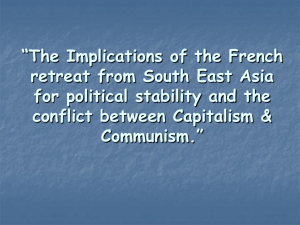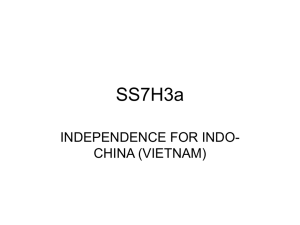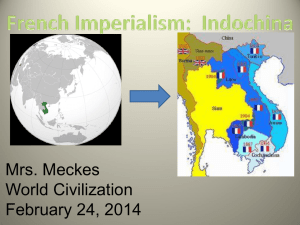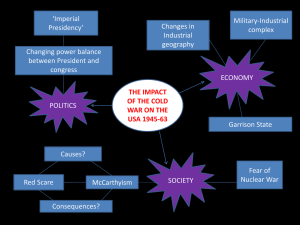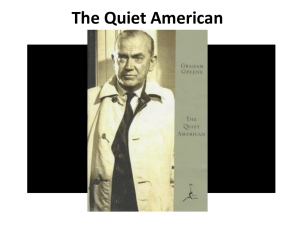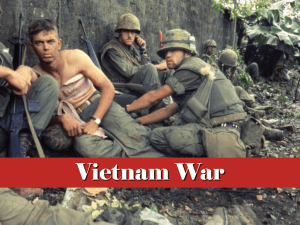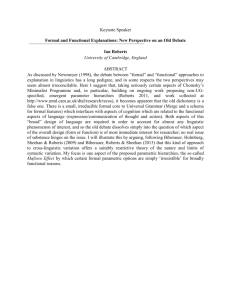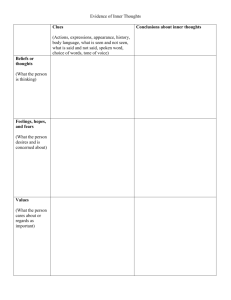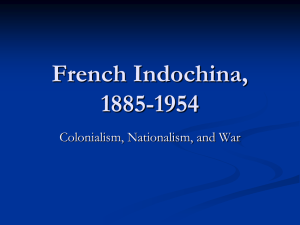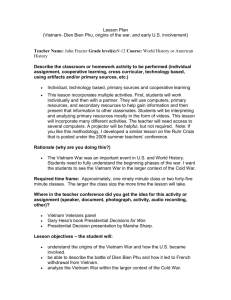Click here to view my artifact from History 301.
advertisement
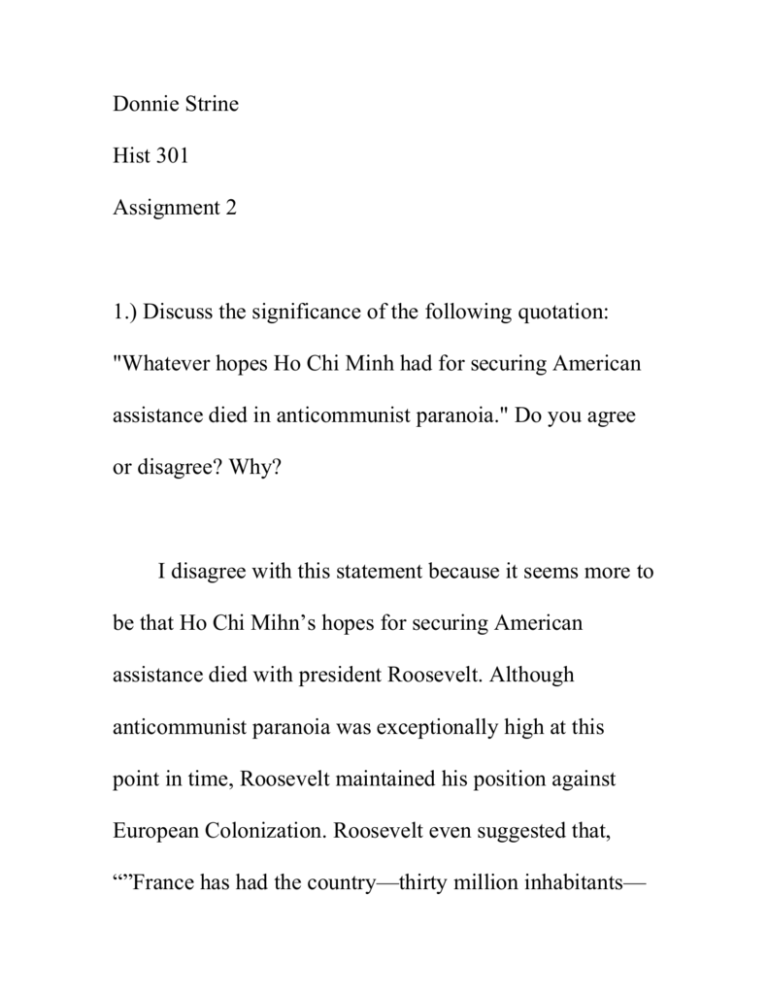
Donnie Strine Hist 301 Assignment 2 1.) Discuss the significance of the following quotation: "Whatever hopes Ho Chi Minh had for securing American assistance died in anticommunist paranoia." Do you agree or disagree? Why? I disagree with this statement because it seems more to be that Ho Chi Mihn’s hopes for securing American assistance died with president Roosevelt. Although anticommunist paranoia was exceptionally high at this point in time, Roosevelt maintained his position against European Colonization. Roosevelt even suggested that, “”France has had the country—thirty million inhabitants— for nearly one hundred years, and the people are worse off than they were at the beginning… The people of Indochina are entitled to something better than that”” (Olson and Roberts 18). This leads me to believe that after the end of World War II he would have readily attempted to help Ho Chi Mihn achieve his dream of Vietnamese independence. Roosevelt’s position leads me to believe that perhaps he would have been willing to attempt to bring Vietnam into the Capitalist world by helping them alleviate their French burden. Britain and France maintained their stance even though Roosevelt pressured them to consider giving up their colonial affiliations, but the issue may have been looked upon in a different light after the end of World War II considering the United States great contribution to the war effort. Truman, on the other hand, didn’t have the slightest bit of concern regarding Indochina. “Germany was in flames but not yet defeated. Japan was losing the war but refused to entertain the fact. There were troubles in Palestine, a meeting was scheduled with Joseph Stalin, and, of course, there was the entire question of the bomb” (Olson and Roberts 19). The new president was forced with resolving these situations currently most important to the United States. Truman just didn’t have the time of day for the concerns of Ho Chi Mihn or the people of Indochina. 2.) According to General Jacques Leclerc, "Fighting the Vietminh will be like ridding a dog of its fleas." What does this mean? Is it an accurate description of the French Vietnam War? Why or why not? This statement means that regardless of how the French attempt to defeat the Vietminh, they will continue to resist and pester them week after week. This is very accurate description of the French Vietnam War because this is exactly what the Vietminh had planned to do. “They assumed that France would not have the resources to stay for the long haul” (Olson and Roberts 24). Ho Chi Minh, Giap, and Wei Guoqing (Chinese military official sent to help prepare Vietnam for guerilla war) used the terrain and climate to the best of their ability. “Meteorologists classify it as tropical monsoon, but the French troops dubbed it “wet hell”” (Olson and Roberts 24). Conditions were miserable for French troops fighting and seeking our guerilla targets in Vietnam. Troops were either wet from sweating or from the monsoonal rains at all times. There was no relief in such a harsh environment, and this really took a toll on the soldiers who hailed from a much milder climate. The Vietminh’s goal was to be an annoyance, and the climate and constant guerilla attacks most certainly harassed the dog during the French Vietnam War. Georges Thierry d’Argenlieu most certainly did not fit into the camp of belief that the Vietmihn could prevail over the mighty French. A naval man, he was a serious French supremacist and thought that the French would regain control of Indochina without much struggle. Unfortunately, he underestimated the Vietminh’s ability to wage guerilla war. This kind of arrogance and ignorance played into the Vietminh’s plan to outlast the French. This would eventually exhaust the French of their resources and their patience. 3.) “The battle of Dien Bien Phu was the most crucial battle in the French Indochina War.” Do you agree or disagree? Why or why not? In any case, why did President Eisenhower refuse to intervene militarily (with American troops and/or airpower) at Dien Bien Phu? Do you agree with his decision? Why or why not? Yes, I agree that Dien Bien Phu was the most crucial battle of the French Indochina War. In fact, it was over before it began due to poor planning from General Navarre and arrogance from Colonel Castries. Fighting in the highlands largely played into the hands Vo Nguyen Giap, and his information specifically on Navarre’s plans at Dien Bien Phu helped him even further. “… Vo Nguyen Giap was dumbfounded… the roads were narrow and exposed… Vietminh artillery would prevent supply aircraft from landing at the hastily constructed airfield… Even in dry weather the ground was covered with heavy, vined brush that would clog tank tracks” (Olson and Roberts 33). Navarre chose a situation in which he failed to see what was stacked against him, and because of this he suffered defeat at Dien Bien Phu, thus dealing the final debilitating blow in the French Indochina War. President Eisenhower decided not to intervene militarily because of the possibility of dragging the United States immediately into another war in Asia. I agree with Eisenhower’s philosophy at the time of his decision. The United States public most certainly did not want military intervention in Vietnam. He was concerned that the use of airpower would either culminate in the use of the atomic bomb or in the deployment of ground troops in Vietnam. In a meeting regarding possible use of atomic weapons in Vietnam President Eisenhower exclaimed, “You boys must be crazy. We can’t use those awful things against the Asians for the second time in less than ten years. My God!” (Olson and Roberts 38). I agree with his decision. The United States would have realized sooner that the Vietminh would have to be wiped off of the Earth to be defeated and that it was a hopeless effort, however, it would have been blood on Eisenhower’s hands. 4.) Which countries were the major participants in the Geneva Convention of 1954? Which countries emerged from the conference "victorious"? Which countries were "defeated"? Explain and justify your answer. The major participants in the Geneva Convention of 1954 were the Soviet Union, France, United Stated, Britain, and Vietnamese representatives. The Soviet Union and Britain were the only two countries without a clear political motivation at Geneva. They emerged as the leaders of the conference. The United States wanted Indochina to remain democratic. The Vietnamese wanted to gain independence. Lastly, the French sought to maintain some influence in Indochina. France emerged as the only truly victorious nation. Although the French defeat at Dien Bien Phu seemed to be a great victory for the Vietminh, the Geneva Conference of 1954 quickly turned the tides on that feeling of defeat. The French Prime Minister Mendes-France stated upon gaining his position “I promise to resign if, one month from now, on July 20, I have failed to obtain ceasefire in Indochina” (Olson and Roberts 40). Mendes-France obtained ceasefire, and a decision to draw the border between North and South Vietnam at the 7th parallel. The Vietminh were the biggest losers at Geneva. “A number of European and American journalists witnessed Vietminh soldiers, upon learning of the Geneva Accords, begin to sob uncontrollably over the sacrifice of so much for so little” (Olson and Roberts 41). They won the war against the French, but “Diplomacy seemed to have trumped military victory” (Olson and Roberts 41). The United States also was a loser. The possibility for a domino to fall in Indochina was still alive and very real. This was their sole goal at Geneva, and they most certainly failed. “Secretary of State John Foster Dulles told the American delegation to leave the agreement unsigned” (Olson and Roberts 41). This in a way foreshadowed possible complications with the United States in Indochina that were soon to come. 5.) From Appy, identify Henry Prunier and Vo Nguyen Giap and compare and contrast in their assessments of the war? Whose seems the more convincing to you? Why? From his time spent in Vietnam, Prunier developed a very accurate view of the Vietnamese mentality towards the war. He witnessed Ho Chi Minh as a man who was simply looking for help to gain the independence his countrymen long awaited. Prunier understood that this was Ho Chi Minh’s top goal, and that he would stop at nothing to achieve it. He identified the change in American policy as possibly being “One of the greatest disappointments in his life…” (Appy 40). As far as Prunier’s attitude towards America’s involvement in the war he identified himself as a “silent antiwar person” (Appy 40). He chose not to speak out and share his opinions and experiences in fear of him and his family being labeled as Communist. Giap’s views of the beginnings of the war closely resembled that of Prunier. Giap stated “History is not made of “ifs”, but if American leaders had been wiser I think we could have been spared the war” (Appy 42). A fundamental difference between the two lies in the fact that Giap did not see the war as a tragedy or a terrible thing. He viewed the United States involvement as a choice to intervene, while the Vietnamese had no choice because their independence was at stake. Prunier on the other had would not see the war in this light because of his cultural affiliation, and instead viewed the war as a tragedy. For the United States it most certainly was. I agree most with Giap’s views. I especially relate to his that the Vietnamese people had choice but to continue to fight for their independence. This is exactly how the United States gained independence. The American Revolution was an admired topic by Ho Chi Mihn, so much so that he even quoted the American Declaration of Independence in his own declaration.
